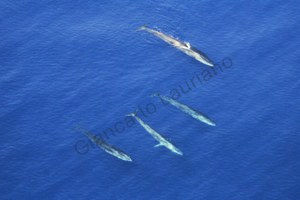Climate Change and Cetaceans in the Mediterranean: a strong reduction in the conditions suitable for the survival of some species is estimated in 25 years
The warming of the Mediterranean Sea is proceeding at a faster rate than the global average, putting all the species that live there at serious risk. Cetaceans are no exception, present with 11 regular species in the Mediterranean, which can respond to variations in climatic conditions by moving, but also conditioned by the distribution of their prey.
A new study, led by ISPRA researchers and just published in the journal Animal Conservation, reveals that in 25 years, there could be a reduction in the climatic conditions suitable for fin whales, spinner dolphins and bottlenose dolphins in the Mediterranean.
The study, through the development of species distribution models, with data collected between 2009 and 2021 and climate variables available from the Climate Change Service of the Copernicus programme, estimated the potential effects of climate change on the distribution of the three cetacean species in the Mediterranean. The results of the study highlight how the rise in sea temperatures in the period 2045-2055 will lead to a loss of habitat for all three species. In particular, the fin whale and the bottlenose dolphin will be the most affected species, forced to leave large portions of their current range and will have to face new climatic conditions that are outside their tolerance range. For the Stenella, it is estimated that part of the habitat loss would be compensated by the potential colonization of new areas with climatic conditions that have become suitable.
The study, therefore, highlights how climate change also determines a dynamic range condition for cetaceans. This changing condition is an aspect usually underestimated in the application of the Marine Strategy Framework Directive (MSFD) criteria relating to the distribution range of species and habitat. Taking into account predictive species distribution maps for future decades could support planning for long-term, sustainable management of Europe's seas.

